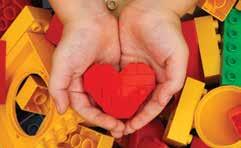LIVE
Ready, Set, Grow! How a Growth Mindset Encourages Resilience, Happiness and Success By Malia Jacobson Let’s face it — raising kids is hard work. But what if there were a simple way to make parenting easier, your kids happier and your household more harmonious? Turns out, there is. When children develop traits like resilience, adaptability and tenacity, known as a growth mindset, they’re more peaceful, more open to new ideas and less likely to melt down when they don’t get their way, say Daniel J. Siegel, M.D. and Tina Payne Bryson, Ph.D., New York Times bestselling authors of The Yes Brain: How to Cultivate Courage, Curiosity and Resilience in Your Child (2018). EARLY YEARS 0–5
ELEMENTARY YEARS 6–12
TEEN YEARS 13–18
A for Effort
Ready, Set, Grow
Fear Factor
The term “growth mindset” was coined by
While some children seem to slip into a growth
Even if kids reach high school with a fixed
Stanford University psychologist Carol Dweck,
mindset easily, others may seem firmly in the
mindset, it’s not too late to work toward a more
Ph.D., and refers to the understanding that
“fixed” mindset camp or fall somewhere in
positive, flexible attitude. First, notes Wood, help
abilities and intelligence can be developed
between. “Signs that a child is using a fixed
teens learn to recognize and counteract ANTs
through effort. Building a growth mindset
mindset include only doing things that they're
(automatic negative thinking). “These types of
— as opposed to a fixed mindset, or the
good at, using the same tools, and relying on
thoughts occur routinely with a fixed mindset
belief that ability is predetermined and can’t
skills that they know well. A child with a fixed
because the general idea is that you’re either
be changed through hard work — is linked
mindset may be unwilling to try new things or
born able to do something or not,” she says.
to better grades, more resilience and higher
to explore other ways of thinking,” says Nedra
When “I can’t do that” seems to be your teen’s
levels of achievement. Caregivers can begin
Glover Tawwab, LCSW, owner of Kaleidoscope
default thought pattern, asking gentle questions
encouraging a growth mindset in toddlerhood
Counseling in Charlotte, North Carolina.
can help uncover what’s underneath. Often,
simply by ditching the “good job” habit.
When a child seems stuck in a fixed mindset,
these automatic “no” responses are rooted in
This type of reflexive, automatic parental praise
it’s worthwhile to nudge them toward a more
fear of failure, says Wood. “To help uncover the
seems harmless, but the unintended lesson
expansive, growth-oriented perspective because
underlying fear, caregivers can ask questions
for children is that a good outcome is the only
a fixed mindset can contribute to issues with
like ‘Is it true that you could get better at
acceptable one and that their effort matters
self-esteem, anxiety and depression, notes
this?’ or ‘Let’s assume that you are able to do
less than the results of those efforts. When
Tawwab. Encouraging creativity and self-
this, how would that feel?’ The point is not to
children focus on outcomes instead of effort,
expression, characteristics of a growth mindset,
convince or force your teen into action, but to
they’ll be less likely to accept failure and less
can help a child break out of the “fixed” zone.
allow them to feel their fear while considering
open to the idea that consistent effort creates
“When a child struggles with a fixed mindset,
a new viewpoint,” notes Wood. Helping teens
success. Shift your focus to a child’s effort by
caregivers can encourage them by celebrating
begin to look past their fear of failure to see
swapping phrases that focus on outcomes,
moments where they try something new,” says
the value in trying something challenging —
like “Good job!”, for phrases that emphasize
Kamini Wood, a certified life and resilience coach
even if they don’t succeed — helps build the
effort, like “You worked really hard on that!”
for girls, teens and young women in Cary, North
resilience that leads to lifelong success.
or “I can tell you really focused—way to go!”.
Carolina. “Reveal the growth to the child. Allow the child to embrace the moment where they tried something outside of the comfort zone.”
10 PLAYGROUND Jun / Jul 2020





